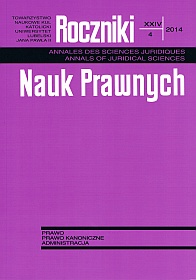The concept of patrimonium stabile
Abstract
The patrimonium stabile is a new concept in the 1983 Code. It comprises of moveable and im-movable goods, which by the legitimate designation (legitima assignatione) of the competent eccle-siastical authority were established as a secure basis for the existence of juridical person for the fu-ture. Patrimonium stabile allows the independent fulfillment of the mission of the juridical person for which it was established and therefore is subject to legal protection in accordance with the law. The distinction between stabile and non stabile patrimonium should be recorded regularly in the up-dated inventories (can. 1283, 2º).
Administrators cannot make gifts for pious purposes or Christian charity out of the movable goods which is part of the patrimonium stabile (cf. can. 1285). In order to make any act of alienation of ecclesiastial goods, stating patrimonium stabile, administrators are required to observeve can. 1291-1294 and can. 638 § 3, whenever their value exceeds the sum determined by law. Canons on alienation (can. 1291-1294) should be obseved not only in alienation, but also in any dealings in which the patrimonial condition of the juridical person may be jeopardised (can. 1295). Patrimonium stabile is not subject to taxation, but the income derived from it may be taxed (see. can. 264 § 2 and can. 1263).
References
Cafardi Nicholas: Alienation of Church Property, [w:] Church Finance Handbook, red. K.E. McKenna, L.A. DiNardo, J.W. Pokusa. Washington 1999, s. 247-266.
De Paolis Velasio: De bonis Ecclesiae temporalibus in novo Codice Iuris Canoni-ci, Periodica 73 ( 1984), s. 113-151.
De Paolis Velasio: Los bienes temporales de la Iglesia, Madrid 2012.
Dubiel Stanisław: Uprawnienia majątkowe Kościoła Katolickiego w Polsce w świetle Kodeksu Prawa Kanonicznego z 1983 roku Konkordatu z 1993 roku i ustaw synodalnych, Lublin 2007.
Grazian Francesco: Patrimonio stabile. Istituto dimenticato?, Quaderni di Diritto Ecclesiale 16 (2003), s. 282-296.
Kennedy Robert T.: The Temporal Goods of the Church, [w:] New Commentary on the Code of Canon Law, red. J.P. Beal, J. A. Coriden, T.J. Green. New York 2000, s. 1449-1525.
López Alarcón Mariano: Book V. Temporal Goods of the Church, [w:] Code of Canon Law Annoted, red. E. Caparros H. Anbé. Montreal 20042, s. 963-1016.
Pawluk Tadeusz: Prawo kanoniczne według Kodeksu Jana Pawła II, t. IV, Olsztyn 1990.
Pinto Pio V.: Commento al Codice di Diritto Canonico, Città del Vaticano 2001.
Renken John A.: Church Property. A Commentary on Canon Law Governing temporal Goods in the United States and Canada, Ottawa 2009.
Renken John A.: The Stable Patrimony of Public Juridic Persons, The Jurist 70 (2010), s. 131-162.
Schouppe Jean P.: Derecho patrimonial canónico, Pamplona 2007.
Świto Lucjan: Alienacja majątku kościelnego w diecezjach rzymskokatolickich w Polsce. Olsztyn 2010.
Tomkiewicz Małgorzata: Obrót majątkiem Kościoła rzymskokatolickiego w Polsce, Olsztyn 2013.
Wójcik Walenty: Dobra doczesne Kościoła, w: Walenty Wójcik, Józef Krukowski, Florian Lempa, Komentarz do Kodeksu Prawa Kanonicznego z 1983, t. IV, Lublin 1987, s. 47-107.
Copyright (c) 2014 Roczniki Nauk Prawnych

This work is licensed under a Creative Commons Attribution-NonCommercial-NoDerivatives 4.0 International License.


